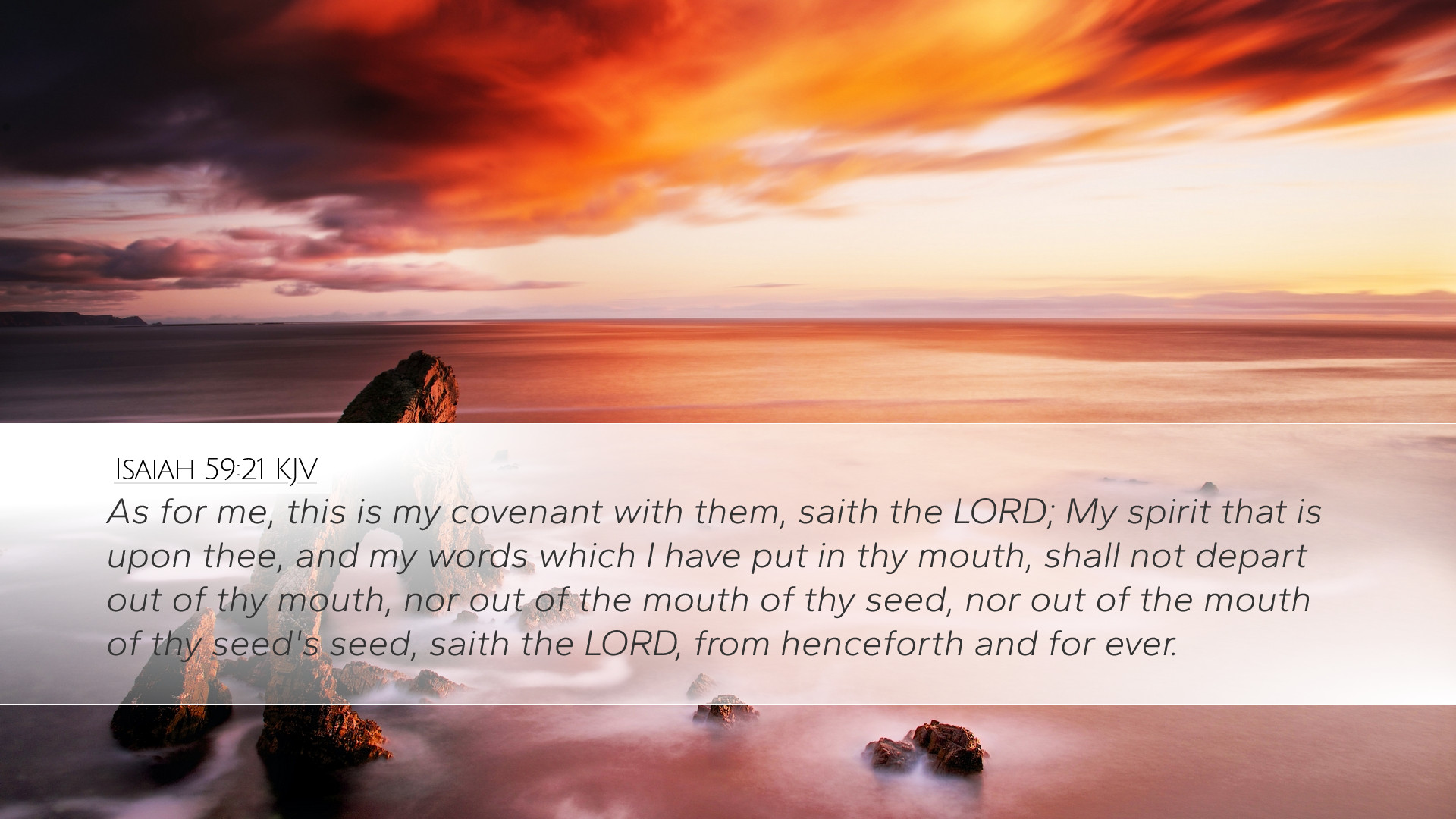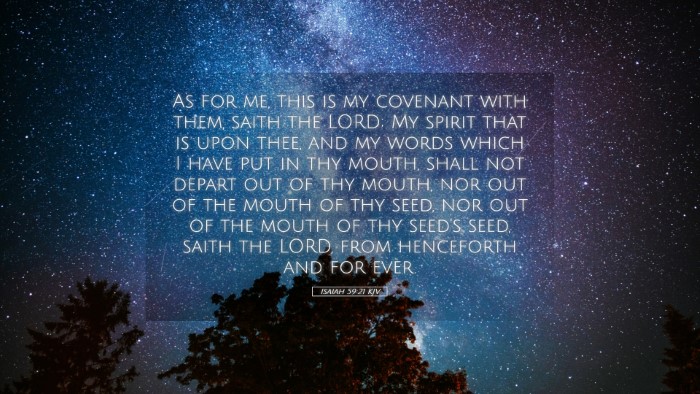Commentary on Isaiah 59:21
Isaiah 59:21 states: "As for me, this is my covenant with them, says the LORD: My Spirit that is upon you, and my words that I have put in your mouth shall not depart out of your mouth, or out of the mouth of your offspring, or out of the mouth of your children's offspring, says the LORD, from now on and forever." This verse carries deep theological significance and reveals the nature of God's covenant with His people.
Introduction
The Book of Isaiah is a profound prophetic text that explores themes of judgment and redemption. In Isaiah 59, the prophet articulates the reasons for Israel's estrangement from God. This particular verse, however, serves as a comforting conclusion that underscores God's enduring promises and the significance of divine providence.
Divine Assurance
The verse begins with God’s declaration: "As for me, this is my covenant with them." This affirmation is significant in that it signals God's unchanging commitment to His people despite their failures. Public domain commentaries emphasize that God’s covenants are irrevocable.
-
Matthew Henry: Highlights that the Lord reassures His people by reaffirming His covenant, thus reminding them of the constancy of His presence and promises.
-
Albert Barnes: Notes the continuity of divine assurances, suggesting that God's covenant transcends generations, echoing through the lineage of His faithful.
-
Adam Clarke: Points out the graciousness of God, who, even when His people stray, extends His mercy and maintains His covenant.
The Role of the Spirit
The subsequent phrase, "My Spirit that is upon you," directly connects the promise of God's presence with the empowerment of His people. Commentators assert that this reflects the theological concept of the indwelling of the Holy Spirit.
-
Matthew Henry: Explains that the Holy Spirit is the source of strength, guidance, and illumination for the believer, essential for walking in covenant fidelity.
-
Albert Barnes: Points out that the presence of the Spirit implies divine influence upon the mind and heart of God's people, enabling them to live according to His Word.
-
Adam Clarke: Stresses that the Spirit's guidance is crucial for understanding and enacting God's covenant requirements, portraying a deep reliance on divine assistance.
The Nature of God’s Word
The phrase "and my words that I have put in your mouth" highlights the intimate relationship between God's Word and His people. The commentary indicates that God does not merely speak; He actively imparts His words to His followers.
-
Matthew Henry: Affirms the transformative power of God’s Word, which is essential for edifying the believer and ensuring that the faithful communicate His truth to successive generations.
-
Albert Barnes: Identifies the Word of God as a tool for instruction and encouragement, signifying the necessity of Scripture in the life of the believer.
-
Adam Clarke: Observes the generational aspect of this promise, emphasizing that the words of God are meant to be taught and passed down, ensuring the continuity of faith.
Covenantal Legacy
The mention of "nor out of the mouth of your offspring, or out of the mouth of your children's offspring" emphasizes the enduring nature of God's promises. Commentators agree that this extends the covenant beyond the immediate recipients to future generations, enriching Israel's legacy of faith.
-
Matthew Henry: Implies that the blessings of covenant faith are communal, intended to resonate throughout the lineage of God’s people, fostering a culture of reverence for His Word.
-
Albert Barnes: Notes that this promise reinforces the importance of teaching children about God’s ways, a vital practice in fostering future faithfulness.
-
Adam Clarke: Suggests that such a promise motivates the current generation to uphold their responsibilities to teach the next, ensuring that the covenant community thrives.
Conclusion: An Everlasting Promise
Finally, the assurance "from now on and forever" encapsulates the timeless nature of God’s assurances. It reaffirms God’s unwavering commitment throughout the ages regardless of human failings.
-
Matthew Henry: Concludes that God’s covenants are not only for a time or occasion but are designed to bring His people into an everlasting relationship with Him.
-
Albert Barnes: Indicates that this promise serves as an eternal covenant that invites all generations into a living relationship with their Creator.
-
Adam Clarke: Encourages readers to embrace this covenant, recognizing it as a foundational aspect of their faith and walk with God.
The message of Isaiah 59:21 is profound, revealing not just God's faithfulness in the past but His ongoing commitment to nourish and empower His people. It challenges pastors, students, theologians, and scholars alike to embrace the depth of divine covenant fidelity and to communicate this enduring legacy to every generation.


